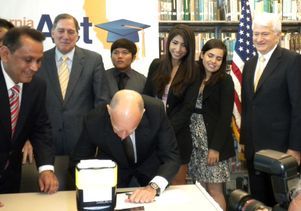The California dream, just likethe crisp air of High Mountain, like the mist and fog of MuirWoods, is elusive and visional. Just as James Rawls says in theessay “California: a Place, a People, a Dream” that “the CaliforniaDream is transcendent, creating a unity, a whole, a merging ofpast, present, and future in the total California experience” (23),the dream is not as simple as a hope, but spans time and space,connects the past with the future, and make the California alive.Rawls argues that California is a place with salubrious climate,romance, and freedom when he discusses the promises of Californiadream. But the dream becomes complicit when involving theparadoxes. Rawls claims that the growth of population lead tocontrol of growth, the chance of making life better lead todisillusionment, and the economic success lead to environmentpollution problems. The promises always come with paradoxes andboth “are at the center of the California Dream” (Rawls 29). TheCalifornia Dream, never ended, unbounded by time, space, and race,bearing the different kinds of dreams from the residents andnewcomers, creating a new life for the dreamers, with the paradoxesbehind the promises, has become a symbol, a culture, an experiencefor the whole California.

As Rawls says “In spite of thewithering analyses of the past, the promises of California remainundiminished, bring new generations of newcomers from around theworld” (29), the California Dream is never ended. It attractsthousands of immigrants to bring their own California Dreams tothis place. Just like any other people who came to California topursuit their dreams, my mother, one of the immigrations, came toSacramento one year before I decided to begin my overseas study.The dream of my mother is not that much complicated but possiblythe most common one. As an artist, she loves any piece of the woodsaround the mountain, she loves to enjoy the sunshine and thesalubrious climate, and she loves lying down on the chair andlooking at the expansive starry night sky during the summer. Mymother’s dream is just as simple as “a love affair with an idea, amarriage to a myth” (Rawls 23). Every single people has their ownversion of the California Dream. Bearing the different kinds ofdreams from the residents and newcomers, the California Dream, isnever diminished.
The dark site of the CaliforniaDream cannot be ignored as Rawls argues that “Promises and paradoxare at the center of the California Dream” (29). Rawls claims thatone of the paradoxes is the economic development lead toenvironment pollution since “California has long been abattleground between the forces of economic development andenvironmental protection” (29). The pursuit of wealth is commonCalifornia Dream for every residents in this state. But the realityis the “fast growth” will break the balance between the economicdevelopment and environmental protection. Another paradox is thegrowth of population lead to control of growth. According toRawls’s argument “the California Dream succeeds in attracting evergreater numbers of people, the ability of California to fulfill itspromises diminishes” (27), gradually the paradise we ever have islost and what left is the growing number of problems afterCalifornia lost control of the increasing population. The mostsignificant problems are the terrible traffic gridlock, thedecreasing quality of education, the excessively use of the naturalresource. Although California Dream succeed attracting more andmore people to migrate to this state, the paradox of growth, theultimate success of the California Dream, will lead to a utterdemise. We have to face these paradoxes because they are part ofthe California Dream and they help us to recognize ourselves andmake the dream alive.
The California Dream, formed byboth promises and paradoxes, has changed the life of Californians.On the one hand, in spite of the paradoxes, the promises, whichrepresent the positive site of the California dream, giving the newgeneration of residents and immigrations a hope, is neverdiminished. On the other hand, the paradoxes, which make us bereasonable, to recognize ourselves and force us to be creative andfind a new way get through the difficulty. Just like what Rawlssays “It is through the pursuit of these virtues that we ensure thesurvival of California—a place, a people, a dream” (30), theCalifornia Dream, with both the promises and paradoxes, has becomea symbol, a culture, an experience for the wholeCalifornia.
(孩子美国读大学两年,数学及ComputerScience相关课程均获得A的成绩,但美国教授认为孩子的英文阅读与写作水平仍需要提高。这是孩子暑假回国按美国教授要求阅读文献后写的一篇读后感,经请国内英文专业教师评阅,认为文字间已没有Chinglish味。) 爱华网
爱华网



